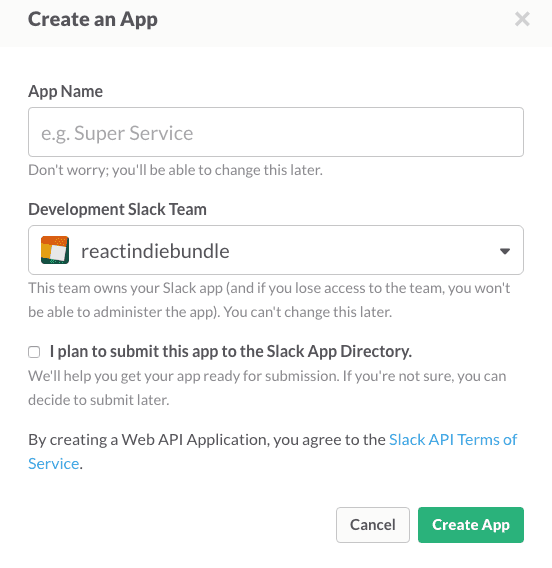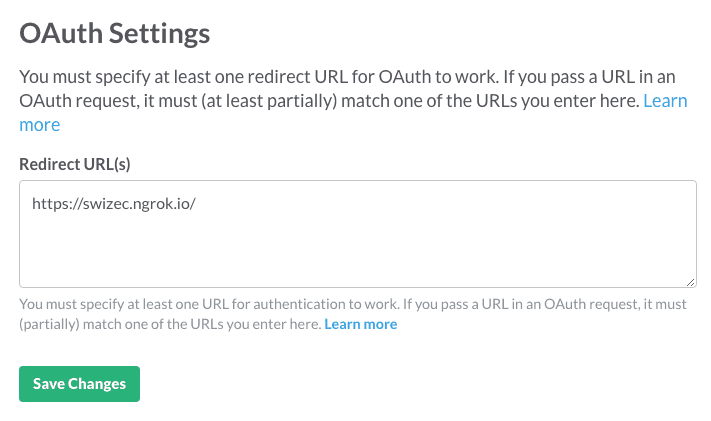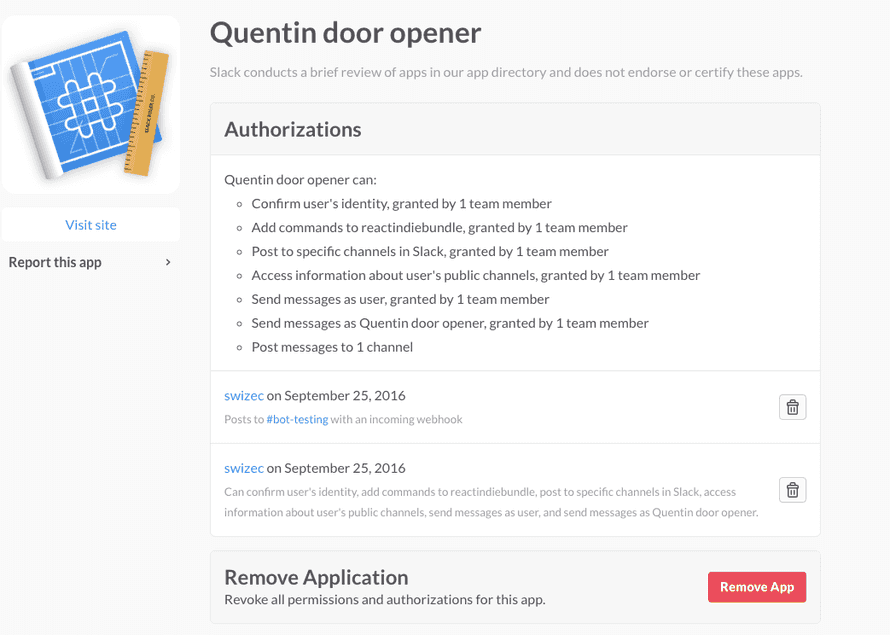This is a Livecoding Recap – an almost-weekly post about interesting things discovered while livecoding ?. Always under 500 words and with pictures. You can follow my channel, here. New streams almost every Sunday at 2pm PDT. There’s live chat, come say hai ?
This is embarrassing. That Slack bot that opens doors from last week… it still doesn’t work. I thought we almost had it. I thought I’d identified the hard part. I thought it was just a matter of sitting down and smashing it out.
I was blindsided by OAuth and the exploding complexity that always comes in tutorials and API docs! They show you how simple their API is. How absolutely beautiful to use!
One line of code, two clicks of set up, and you’re sending messages to Slack like a champ. Two clicks, a bit of code, and you’re a bot! You can listen to people’s conversations.
Champ! King of the world. ??

Oh, you want to actually receive the promised POST requests from those message buttons? Boy, do I have a trip for you!
First, you have to set up a Slack app. Not an ad-hoc custom integration like you’ve had until now. Oh no, you need a real app. It takes a few clicks on this screen:

Then it’s going to say that this app is part of your team, but it’s not. You have to set up OAuth, have a server that can do OAuth, and then authorize your team with this new app. You need to add an https URL on this screen:

On the server side, you’re in for a world of doubya-tee-eff, mate. If you’re on express.js, then you can use Grant to set up Slack OAuth somewhat painlessly. In theory, this is all it takes:
// app.js
var session = require("express-session"),
Grant = require("grant-express");
var grant = new Grant({
server: {
protocol: "https",
host: "swizec.ngrok.io",
callback: "/callback",
transport: "session",
state: true,
},
slack: {
key: "14110144963.81022664631",
secret: "24df277cd8e3d24e32087885c6ee7c80",
scope: [
"chat:write:bot",
"chat:write:user",
"channels:read",
"commands",
"incoming-webhook",
],
//callback: '/connect/slack/callback'
},
});
// ...
app.use(session({ secret: "grant", resave: false, saveUninitialized: true }));
app.use(grant);
This uses express’s in-memory session storage, which means that as soon as you restart the server, sessions will be forgotten. The good news is that you don’t have to hold on to them; you just need them long enough to do the OAuth dance.
Oh ,and that callback parameter Grant asks for? That is not the same as the Redirect URL that Slack asks for. Set them to the same value, and you’re going for an endless redirect ride. Learned that the hard way. ☺️
Go to <server>/connect/slack and do the OAuth dance for your team. If all goes well, Slack rewards you with this message:

If you go to Slack’s app management panel, you should see something like this:

/partyhard
Your app is officially set up for your team. The slash command you created while debugging and trying to figure out what’s up works. You say /hai and it says pong.

But when you click a button on a message that you sent, you still get the error. No POST request hits your server. It’s an immediate error. It doesn’t even try to do the thing.

It’s an identity issue, I think. Based on last week’s livecoding, we’re sending Slack messages based on an ad-hoc integration API key. But we’re a real app, so we should send them as the app.
Slack’s documentation doesn’t say how to do that. It talks only about API keys, but apps don’t get API keys. Or I don’t understand the docs. Or I’m blind.
I should send them an email. ?
Continue reading about Livecoding #23: Slackbots and OAuth
Semantically similar articles hand-picked by GPT-4
- Livecoding #22: A door-answering Slackbot
- Livecoding #28: Productizing the door-answering Slack bot, Part 1
- How to make Slack and Twilio talk to each other
- Livecoding #27: New React Indie Bundle page almost done
- Livecoding recap #42: HackerNews app where people are nice
Learned something new?
Read more Software Engineering Lessons from Production
I write articles with real insight into the career and skills of a modern software engineer. "Raw and honest from the heart!" as one reader described them. Fueled by lessons learned over 20 years of building production code for side-projects, small businesses, and hyper growth startups. Both successful and not.
Subscribe below 👇
Software Engineering Lessons from Production
Join Swizec's Newsletter and get insightful emails 💌 on mindsets, tactics, and technical skills for your career. Real lessons from building production software. No bullshit.
"Man, love your simple writing! Yours is the only newsletter I open and only blog that I give a fuck to read & scroll till the end. And wow always take away lessons with me. Inspiring! And very relatable. 👌"
Have a burning question that you think I can answer? Hit me up on twitter and I'll do my best.
Who am I and who do I help? I'm Swizec Teller and I turn coders into engineers with "Raw and honest from the heart!" writing. No bullshit. Real insights into the career and skills of a modern software engineer.
Want to become a true senior engineer? Take ownership, have autonomy, and be a force multiplier on your team. The Senior Engineer Mindset ebook can help 👉 swizec.com/senior-mindset. These are the shifts in mindset that unlocked my career.
Curious about Serverless and the modern backend? Check out Serverless Handbook, for frontend engineers 👉 ServerlessHandbook.dev
Want to Stop copy pasting D3 examples and create data visualizations of your own? Learn how to build scalable dataviz React components your whole team can understand with React for Data Visualization
Want to get my best emails on JavaScript, React, Serverless, Fullstack Web, or Indie Hacking? Check out swizec.com/collections
Did someone amazing share this letter with you? Wonderful! You can sign up for my weekly letters for software engineers on their path to greatness, here: swizec.com/blog
Want to brush up on your modern JavaScript syntax? Check out my interactive cheatsheet: es6cheatsheet.com
By the way, just in case no one has told you it yet today: I love and appreciate you for who you are ❤️
